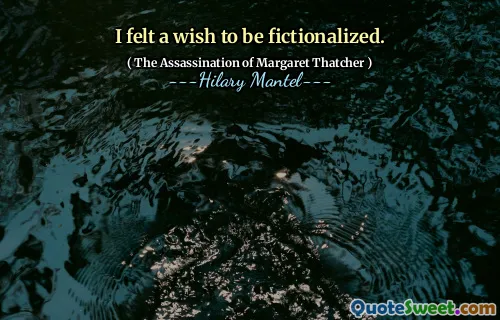The book "The Assassination of Margaret Thatcher" by Hilary Mantel is a compelling collection of short stories that explore various themes through the lens of history and politics. The title story imagines an alternate reality in which an assassination attempt is made on former British Prime Minister Margaret Thatcher. Mantel's sharp prose vividly captures the political atmosphere of the time, delving into the motivations and fears of the characters involved. Through a series of interconnected narratives, the stories reflect on the complexities of power and the moral ambiguities in the lives of ordinary individuals. Mantel's deep character studies reveal the psychological landscapes of her subjects, often highlighting their inner conflicts and societal pressures. The stories are rich with historical references, offering readers insights into the era's political tensions. Mantel's storytelling is both engaging and thought-provoking, prompting reflections on fate, choice, and the unpredictability of history. The collection not only entertains but also challenges readers to consider the implications of political actions on personal lives. Overall, the book serves as a powerful examination of how significant events shape individual destinies and the course of society.
The book "The Assassination of Margaret Thatcher" by Hilary Mantel is a compelling collection of short stories that explore various themes through the lens of history and politics. The title story imagines an alternate reality in which an assassination attempt is made on former British Prime Minister Margaret Thatcher. Mantel's sharp prose vividly captures the political atmosphere of the time, delving into the motivations and fears of the characters involved.
Through a series of interconnected narratives, the stories reflect on the complexities of power and the moral ambiguities in the lives of ordinary individuals. Mantel's deep character studies reveal the psychological landscapes of her subjects, often highlighting their inner conflicts and societal pressures. The stories are rich with historical references, offering readers insights into the era's political tensions.
Mantel's storytelling is both engaging and thought-provoking, prompting reflections on fate, choice, and the unpredictability of history. The collection not only entertains but also challenges readers to consider the implications of political actions on personal lives. Overall, the book serves as a powerful examination of how significant events shape individual destinies and the course of society.
More »
Today Birthdays
1729 -
Edmund Burke
1949 -
Haruki Murakami
1954 -
Howard Stern
1876 -
Jack London
1993 -
Zayn Malik
1951 -
Kirstie Alley
1863 -
Swami Vivekananda
1923 -
Alice Miller
1987 -
Naya Rivera
1825 -
Brooke Foss Westcott
1944 -
Joe Frazier
1951 -
Rush Limbaugh
1964 -
Jeff Bezos
1978 -
Jeremy Camp
1628 -
Charles Perrault
1856 -
John Singer Sargent
1970 -
Kaja Foglio
1953 -
Rick Santelli
1986 -
Gemma Arterton
1968 -
Raf Simons
1958 -
Christiane Amanpour
1966 -
Olivier Martinez
1996 -
Ella Henderson
1917 -
Maharishi Mahesh Yogi
1949 -
Ottmar Hitzfeld
1928 -
Ruth Brown
1968 -
Heather Mills
1946 -
George Duke
1968 -
Rachael Harris
1923 -
Ira Hayes
